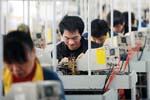Unclear 2012 for ChiNext, analysts caution
Updated: 2012-02-01 08:58
By He Wei (China Daily)
|
|||||||||||
SHANGHAI - Strong earnings reports by companies listed on China's start-up board are encouraging, but they don't provide a "crystal ball" for the market's direction, stock analysts and investors said.
Nearly two-thirds of the companies listed on ChiNext, the Nasdaq-style second board, reported profits last year, even after a bear market erased more than 30 percent from the start-up index.
Out of 285 companies, 191 had reported profits through estimates or annual reports as of Tuesday, accounting for 67 percent.
Gains attributable to equity holders of the parent, on a reported basis, ranged from 18.9 billion yuan ($3 billion) to 21.3 billion yuan.
The reports show that 35 companies posted net profit gains exceeding 50 percent, with YLZ Information Technology Co Ltd, a Xiamen-based computer application company, in first place.
YLZ achieved more than 150 percent profit growth by providing key technology for the country's social security cards.
Enterprises in traditional sectors, such as manufacturing and medicine, generally fared worse.
But along with the major board, the growth enterprise board slid conspicuously last year, dropping below 700 points from 1142.17 in 2010.
The dramatic loss came partly in reaction to a central bank decision that lenders had to set aside more reserves against margin deposits, boosting speculation liquidity would tighten, said Zhang Gang, a stock analyst from Southwest Securities Co Ltd.
Despite the market's lackluster performance last year, 124 companies listed on ChiNext, compared with 117 in the debut year, data from Wind Information Co Ltd show.
The index faces growing pressure from unlocked shares this year, equivalent to nearly half of the market's current value. "This will deal a heavy blow to the fledging market," Zhang said.
Another major concern is what analysts characterize as an irrational price-to-earnings (PE) ratio, which leads to the overvaluation of stocks.
According to Zhang Lan, an IPO specialist with Zero2IPO Group, the first quarter of last year saw an overwhelmingly high PE ratio of 70 for IPO companies, while the average number stood at 40 for the rest of the year.
That shift "in part helps explain the contraction of the index", Zhang said.
The PE ratio, taken in isolation, doesn't reflect the real value of a company, said Shao Qing from Ping An Securities Co Ltd. "As more companies go public and the market achieves rationality, prices are most likely to fall."
Qian Weihai of Shanghai Securities Co Ltd said the proposed delisting mechanism for ChiNext, which was intended to tighten control over speculation and manipulation, would have a compound effect on the board.
"But the larger picture for 2012 is liquidity easing," which should be favorable for the market, Qian said.
Related Stories
ChiNext Index closes up -- Oct 17 2011-10-17 17:23
ChiNext Index closes down - Sept 23 2011-09-23 16:42
ChiNext Index closes up -- Septe 21 2011-09-21 16:37
ChiNext Index closes 2.31% lower -- Sept 19 2011-09-19 16:25
ChiNext Index closes down -- November 29 2010-11-29 16:05
- Steelmakers registered losses in 2011
- Sany buying German firm
- Unclear 2012 for ChiNext, analysts caution
- Shanghai banks lower mortgage interest rates
- Concerns grow over safety of food imports
- Multinationals keen to recruit Chinese execs
- Ministry 'ready' to face rare earth push
- PMI rises to 50.5% in January








